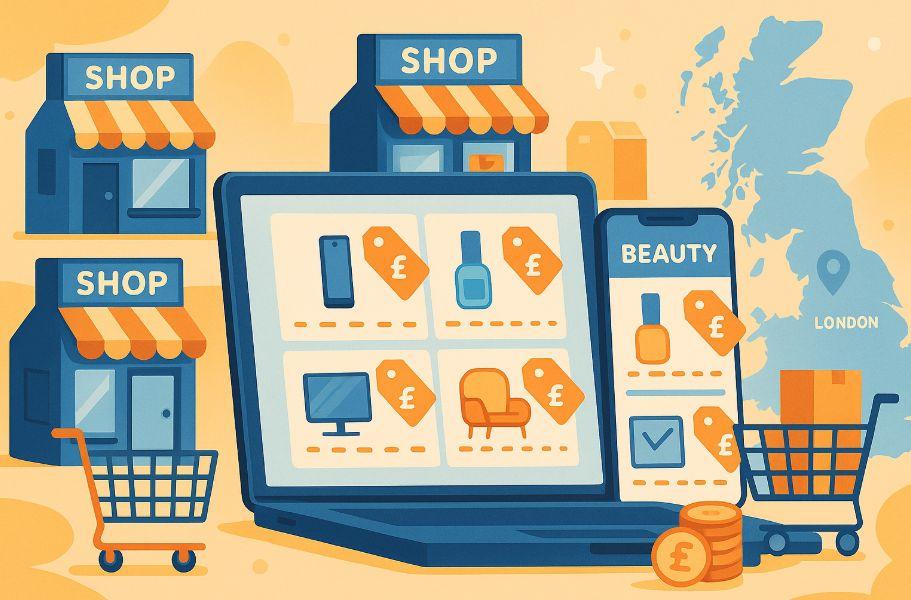In the rapidly evolving world of e-commerce, one name has been steadily gaining recognition in the UK: OnBuy. Known for offering lower prices across a wide range of products, OnBuy has become a popular choice for budget-conscious shoppers, particularly in London and other urban centres. But with prices that often beat larger competitors like Amazon and eBay, a natural question arises why is OnBuy so cheap?
This article explores the inner workings of OnBuy, its business model, pricing strategy, and how it manages to keep costs low without compromising trust or quality. For those curious about affordable online shopping in the UK, this deep dive will help explain why OnBuy stands out in a crowded marketplace.
How OnBuy Operates as a Marketplace?
 OnBuy is a UK-based online marketplace that connects consumers with thousands of sellers. Unlike platforms such as Amazon, which both hosts third-party sellers and sells its own inventory, OnBuy is exclusively a third-party marketplace. It doesn’t stock, ship, or sell any products itself. Instead, it provides the infrastructure for independent sellers to list their products and reach customers.
OnBuy is a UK-based online marketplace that connects consumers with thousands of sellers. Unlike platforms such as Amazon, which both hosts third-party sellers and sells its own inventory, OnBuy is exclusively a third-party marketplace. It doesn’t stock, ship, or sell any products itself. Instead, it provides the infrastructure for independent sellers to list their products and reach customers.
Since its launch in 2016, OnBuy has positioned itself as a fair and transparent alternative to bigger platforms. By allowing only third-party retailers on the platform, it removes any conflict of interest meaning OnBuy never competes with its sellers. This model not only supports local and independent businesses but also opens the door to more competitive pricing.
Why Are OnBuy’s Prices Lower Than Other Online Marketplaces in the UK?
OnBuy’s lower pricing can be largely attributed to its cost-efficient structure and seller-friendly policies. Unlike Amazon, which charges various fees for listing, advertising, and fulfilment, OnBuy operates with significantly lower commission rates. These savings are often passed on to customers in the form of lower product prices.
Another factor contributing to the reduced prices is OnBuy’s decision not to prioritise sponsored listings. Sellers on OnBuy don’t have to pay extra to appear higher in search results, creating a more level playing field and encouraging price competition rather than ad-driven visibility.
Additionally, OnBuy’s streamlined operation, which avoids warehousing and in-house logistics, allows sellers to maintain control over their stock and delivery. This model removes unnecessary layers of cost and gives sellers the flexibility to adjust prices more freely.
How Does OnBuy’s Business Model Contribute to Its Affordability?
OnBuy operates on a business model that emphasises simplicity and cost-effectiveness. Instead of investing in physical infrastructure like warehouses, shipping fleets, or product inventory, it focuses purely on facilitating transactions between buyers and sellers. This significantly reduces its operational costs, allowing the platform to charge sellers less and ultimately keep product prices lower.
Its revenue is primarily generated from seller subscriptions and a flat-rate commission on each sale. Sellers have more control over how they price their items because they aren’t burdened by platform-imposed promotional costs or fulfilment service charges. The absence of these common costs in OnBuy’s model contributes to a more competitive pricing environment across the platform.
What Role Do Low Commission Fees Play in OnBuy’s Pricing Strategy?
 Commission fees are a key differentiator between OnBuy and other online marketplaces. OnBuy’s rates start as low as 5%, while competitors like Amazon or eBay often charge between 10% and 15% or more, depending on the product category and seller plan.
Commission fees are a key differentiator between OnBuy and other online marketplaces. OnBuy’s rates start as low as 5%, while competitors like Amazon or eBay often charge between 10% and 15% or more, depending on the product category and seller plan.
The impact of this difference is significant. When sellers are charged less in commission, they don’t need to inflate their prices just to break even. They can afford to sell products at lower prices while maintaining a healthy profit margin. This pricing flexibility allows sellers on OnBuy to attract cost-conscious buyers without compromising their bottom line.
The simplified commission structure also makes OnBuy appealing to small and medium-sized businesses, who often find it difficult to compete on larger platforms due to high fees and advertising requirements.
Is OnBuy a Legitimate Platform or Too Good to Be True?
Scepticism is natural when prices seem unusually low, but OnBuy is a fully legitimate platform with proper business registration and buyer protections in place. It is a UK company and operates under UK consumer laws, which adds a layer of trust for shoppers.
One of the main indicators of its legitimacy is its payment system. OnBuy processes all transactions through PayPal, providing a secure environment for payments and a safety net for disputes. Buyers benefit from PayPal’s Buyer Protection scheme, which offers recourse in cases of non-delivery or misrepresented products.
The platform also has customer service support based in the UK, and sellers are vetted during onboarding, further helping to maintain a safe and reliable shopping experience.
How Does OnBuy Compare to Amazon and Other UK E-commerce Giants?
When evaluating OnBuy alongside platforms like Amazon and eBay, the differences become clear. OnBuy positions itself as a fairer alternative by not competing with its own sellers. On the other hand, Amazon sells its own branded products, which often appear above third-party listings, giving it an advantage in visibility.
Moreover, OnBuy offers a level of price transparency and product equality that can be lacking on more commercialised platforms. All sellers have equal access to visibility within search results, making it easier for buyers to find genuine value rather than just paid promotions.
A brief comparison of these platforms is shown below:
| Platform | Sells Own Products | Lower Commission | Supports Local Sellers | Buyer Protection |
| OnBuy | No | Yes | Yes | Yes |
| Amazon | Yes | No | Yes | Yes |
| eBay | No | No | Yes | Yes |
OnBuy’s dedication to local seller support and equal treatment of listings makes it a refreshing alternative in a market often dominated by aggressive platform-led competition.
What Makes OnBuy an Attractive Platform for Sellers and Buyers?
 Sellers appreciate OnBuy for its fairness and lower cost of entry. With fewer fees to worry about, sellers especially smaller businesses can focus on offering competitive prices and better customer service. They don’t have to compete with a platform that also sells its own products, as they would on Amazon.
Sellers appreciate OnBuy for its fairness and lower cost of entry. With fewer fees to worry about, sellers especially smaller businesses can focus on offering competitive prices and better customer service. They don’t have to compete with a platform that also sells its own products, as they would on Amazon.
Buyers, in turn, enjoy the benefits of these policies through lower prices, a diverse range of products, and a simplified, ad-free shopping experience. Transactions are backed by PayPal, giving shoppers peace of mind when trying out a platform they may not yet be familiar with.
Are There Any Hidden Costs or Buyer Risks on OnBuy?
While OnBuy provides excellent value, it’s important for shoppers to pay attention to product pages and seller details. Since OnBuy is a third-party marketplace, shipping costs and return policies can vary from one seller to another. Some sellers offer free delivery, while others may charge depending on the product size or destination.
Delivery times can also differ based on seller location and logistics arrangements. It’s advisable for buyers to check seller ratings, estimated delivery timelines, and return conditions before completing a purchase. These precautions help avoid misunderstandings and ensure a smooth transaction.
What Do OnBuy Reviews Reveal About Customer Experience and Trust?
Customer reviews of OnBuy on platforms like Trustpilot generally reflect a positive experience. Shoppers often mention the ease of use, competitive pricing, and the benefits of buying from UK-based sellers. Many reviewers highlight fast delivery and effective customer support when needed.
Of course, as with any large marketplace, there are some critical reviews typically around late deliveries or product dissatisfaction. However, these are usually seller-specific and not necessarily a reflection of the platform itself. OnBuy has a system in place to address disputes and enforce policies that protect both buyers and sellers.
Could OnBuy’s Model Change the Future of Online Shopping in the UK?
 OnBuy’s model aligns well with shifting consumer behaviours. As shoppers increasingly seek transparency, ethical choices, and affordability, OnBuy offers a compelling alternative to mainstream platforms. By supporting local sellers and promoting fair competition, it has the potential to reshape the UK’s online retail space.
OnBuy’s model aligns well with shifting consumer behaviours. As shoppers increasingly seek transparency, ethical choices, and affordability, OnBuy offers a compelling alternative to mainstream platforms. By supporting local sellers and promoting fair competition, it has the potential to reshape the UK’s online retail space.
Its growth trajectory, combined with its dedication to low fees and customer security, suggests that it could become a key player in UK e-commerce especially if it continues to prioritise fairness and affordability over platform profit.
Why Should UK Shoppers Consider OnBuy Over Traditional Retail Giants?
In a market saturated with large retail giants, OnBuy stands out by offering competitive pricing without sacrificing seller integrity or customer service. For London-based consumers and UK shoppers at large, OnBuy presents an opportunity to support local businesses while enjoying the benefits of a secure, streamlined, and often more affordable shopping experience.
With no inflated fees, no self-serving listings, and a focus on genuine product competition, OnBuy offers value in ways that bigger marketplaces often cannot. As more people look for smarter ways to shop online, OnBuy is becoming a strong contender for those who want better prices and a fairer platform.
FAQs
Is OnBuy safe to use for online purchases?
Yes, OnBuy is a secure UK-based platform that uses PayPal for payments, offering protection for both buyers and sellers.
How does OnBuy support local UK businesses?
It gives independent sellers a marketplace to reach customers without competing against the platform itself, helping to boost local commerce.
Does OnBuy offer free delivery on all products?
No, delivery options depend on each seller. Some offer free shipping, while others charge based on location or product size.
What categories are cheapest on OnBuy?
Categories like electronics, homeware, beauty, and tools often feature products priced below those on Amazon or eBay.
Are OnBuy’s sellers verified?
Yes, sellers go through an onboarding process and are rated by customers, ensuring a level of trust and accountability.
Can international buyers use OnBuy?
OnBuy primarily caters to the UK market, but some sellers do offer international shipping depending on their policies.
Does OnBuy have customer service support?
Yes, it has a dedicated UK support team and also allows communication between buyers and sellers through its platform.








